Meiosis
Meiosis is a type of cell division that occurs in sexually reproducing organisms. It is a crucial process that leads to the formation of gametes, such as sperm and egg cells, and ensures genetic diversity in the offspring.
Phases of Meiosis
Meiosis consists of two consecutive divisions, known as meiosis I and meiosis II, each with distinct phases:
- Meiosis I:
- Prophase I: Chromosomes condense, homologous chromosomes pair up in a process called synapsis, and genetic recombination occurs through crossing over.
- Metaphase I: Homologous chromosome pairs align at the cell's equator.
- Anaphase I: Homologous chromosomes separate and move to opposite poles of the cell.
- Telophase I: Two haploid daughter cells are formed, each with half the number of chromosomes as the original cell.
- Meiosis II:
- Prophase II: Chromosomes condense again and the nuclear envelope breaks down.
- Metaphase II: Chromosomes align at the equator of the cell.
- Anaphase II: Sister chromatids separate and move to opposite poles of the cell.
- Telophase II: Four haploid daughter cells are produced, each with a unique combination of genetic material.
Significance of Meiosis
Meiosis plays a critical role in sexual reproduction by generating genetic variability. This is achieved through the processes of independent assortment and crossing over, which result in the formation of genetically distinct gametes.
Study Guide
Here are some key points to focus on when studying meiosis:
- Understand the differences between meiosis and mitosis, another type of cell division.
- Learn the specific events that occur in each phase of meiosis I and II.
- Explore the significance of genetic recombination and how it contributes to genetic diversity.
- Understand the importance of meiosis in sexual reproduction and the formation of gametes.
- Practice solving problems related to meiosis, such as calculating the possible genetic combinations resulting from meiotic divisions.
By mastering the intricacies of meiosis, you will gain a deeper understanding of how genetic variability is generated and inherited in sexually reproducing organisms.
.◂Biology Worksheets and Study Guides High School. Meiosis
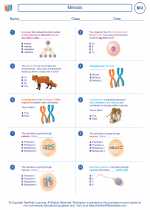
 Worksheet/Answer key
Worksheet/Answer key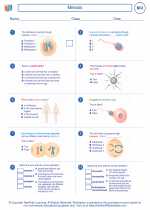
 Worksheet/Answer key
Worksheet/Answer key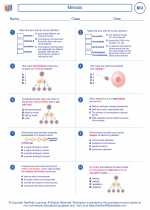
 Vocabulary/Answer key
Vocabulary/Answer key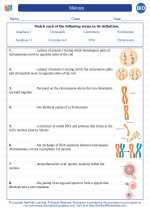
 Vocabulary/Answer key
Vocabulary/Answer key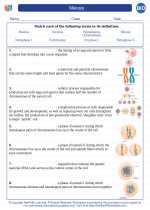
 Vocabulary/Answer key
Vocabulary/Answer key
